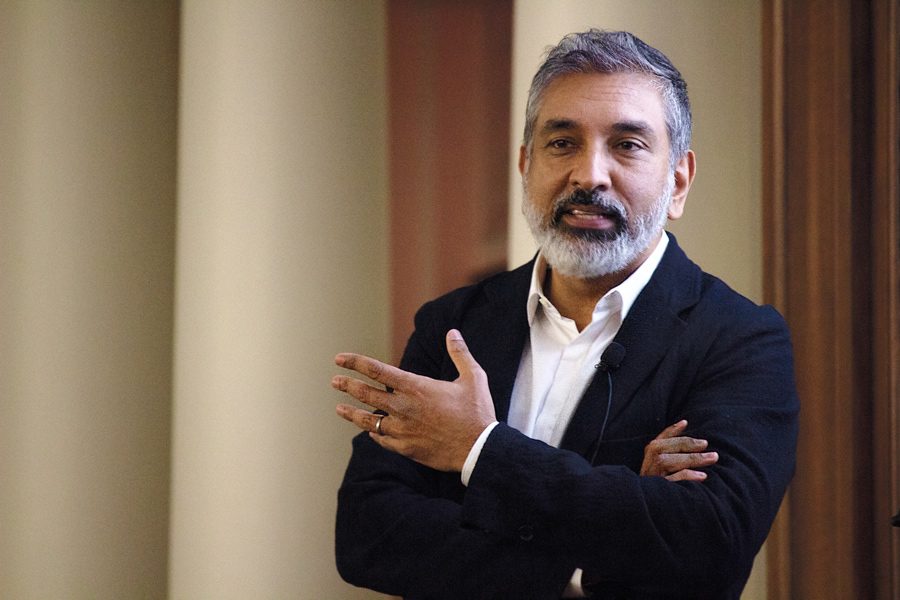Architect discusses the need for more inclusion in public spending, urban planning
Evan Robinson-Johnson/The Daily Northwestern
Vishaan Chakrabarti speaks at the opening keynote address of the Northwestern University Community for Human Rights’ 16th annual conference. Chakrabarti spoke about the future of urbanization and changes in the perception of public goods and services.
January 18, 2019
The key to making public spending more equitable is to change the cultural norms surrounding the topic, architect and urban planner Vishaan Chakrabarti said during a Thursday speech at Harris Hall.
Chakrabarti spoke in front of about 100 people as the opening keynote speaker for the Northwestern University Community for Human Rights’ 16th annual conference. Titled “The Right to the City: Mapping Human Rights in the Urban Landscape,” the conference focuses on how to mindfully design cities during a time of rapid urbanization. Chakrabarti spoke about Practice for Architecture Urbanism, a socially conscious architecture firm he founded, as well as the future of urbanization in the United States.
Chakrabarti said the negative connotation conservatives associate with government spending on public goods represents a dramatic shift from past norms. For example, he said the Federal-Aid Highway Act of 1956 — which spent billions of dollars on highways for the public — was relatively uncontroversial at the time, partly because it served to subsidize a whiter, wealthier population than those who would soon be targeted by the “War on Poverty.”
“When the civil rights movement went out and said, ‘We are part of the public too. We have rights too,’ that broadened the definition of the public,” he said. “Suddenly government was representing more than that select group of people who got the free federal highways.”
Since then, Chakrabarti said, opinions have soured on public goods — but enormous amounts of funding still go to a select few. He said these costs, such as those associated with highways, are characterized as necessary infrastructure rather than subsidies for public goods, a distinction that often shields them from scrutiny.
He pointed to New York’s Penn Station, which he characterized as severely underfunded considering its enormous traffic load and for which he has proposed changes in the past.
“The public we care about is making sure that there aren’t potholes on the highway that’s bringing people out to rich suburban areas,” Chakrabarti said, describing the current approach. “That’s the public we care about. That’s not a subsidy, that’s a government obligation. Fixing (Penn Station) would be a subsidy.”
In discussing ways to expand public services to more diverse populations, Chakrabarti said it’s important for people to focus on affecting change at the government level in addition to a grassroots one. He added that people should aspire to achieve more than just small-scale changes.
“Some things take larger actors,” he said. “Don’t always gravitate towards the small because it seems less bureaucratic and easier to effectuate stuff, because that’s Reagan and Thatcher winning, right? You gotta get at the beast.”
Daniel Paredes, a business student at Loyola University Chicago, said he enjoyed hearing about engineering in a context that wasn’t purely “analytical” or “binary.”
“I really liked it,” Paredes said. “It’s always interesting when I see STEM fields branching out into human rights issues or more political or social issues like that.”
Priti Patel, a senior design associate at the nonprofit Project for Public Spaces, said Chakrabarti’s speech provided her with useful perspectives on the evolution of urban planning. She will also speak at the conference later this weekend.
She added that though she is well-acquainted with Chakrabarti’s work, Thursday’s talk presented her with a more history-oriented approach to urban planning than she was used to.
“It’s nice even for me to be constantly reminded of that history because in the work that I do, it’s so focused on community building that sometimes that history’s kind of lost,” she said.
Email: [email protected]
Twitter: avi_vrghs


